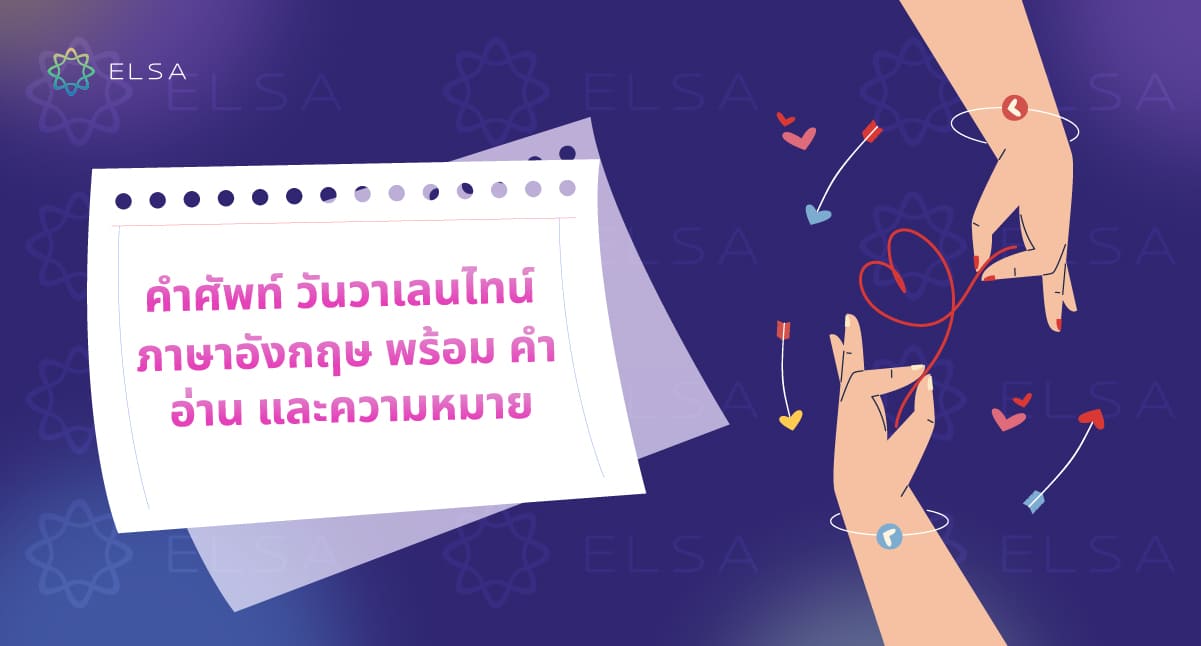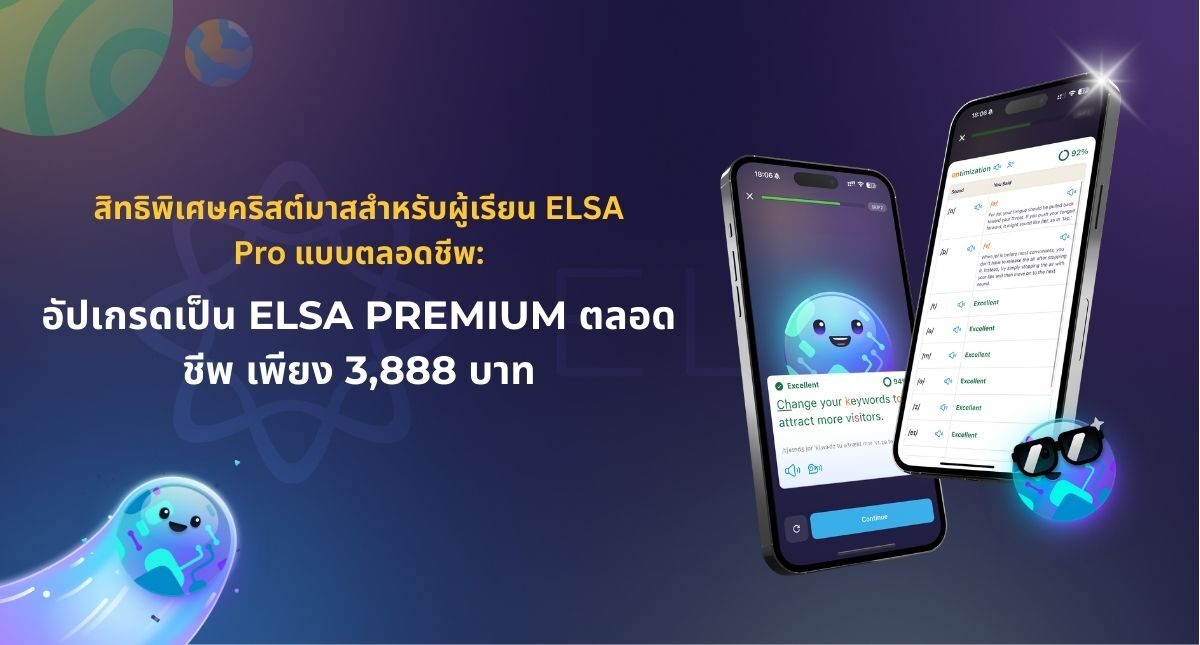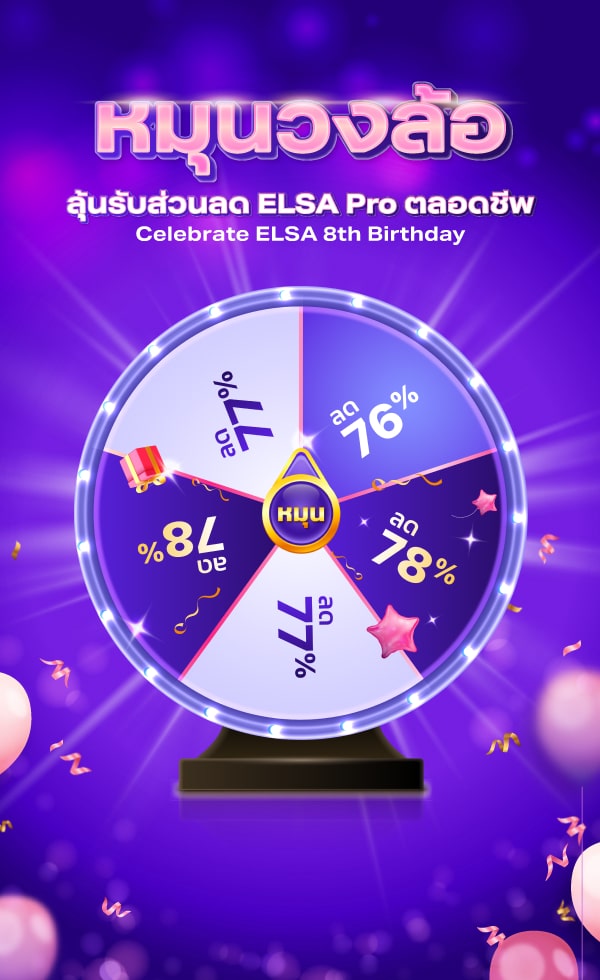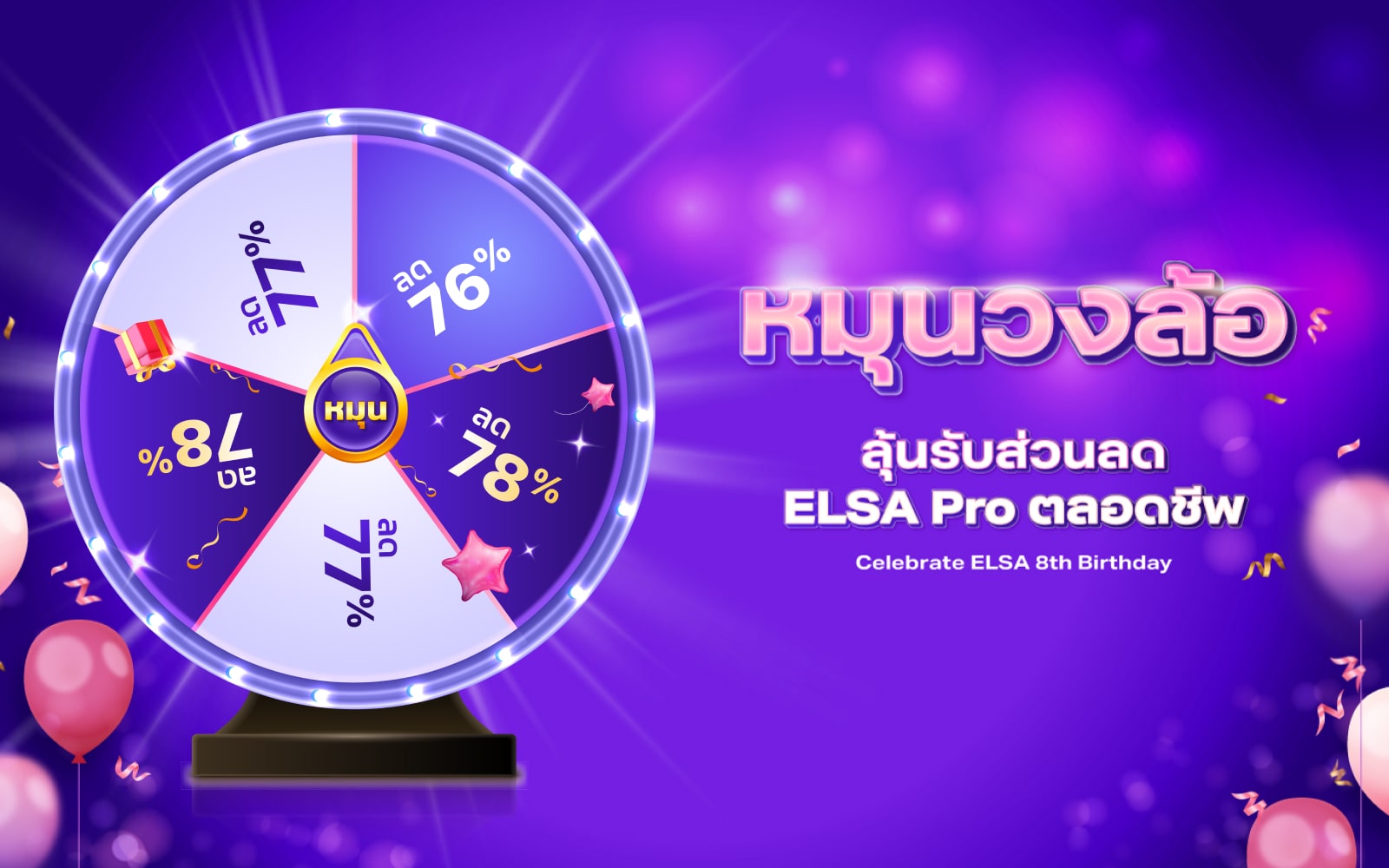คำตรงข้ามภาษาอังกฤษคืออะไร?ในบทความนี้ ELSA Speak จะสะสม คําตรงข้าม ภาษาอังกฤษ พร้อมคําอ่าน คําแปล ที่พบบ่อยที่สุด ช่วยคุณเรียนรู้คำตรงข้ามภาษาอังกฤษเพื่อใช้ในการสื่อสาร เช่น การเปรียบเทียบ การอธิบาย จดไว้เลย เพื่อจะได้ฝึกใช้ในชีวิตประจำวันนะ!
คำตรงข้ามภาษาอังกฤษคืออะไร?
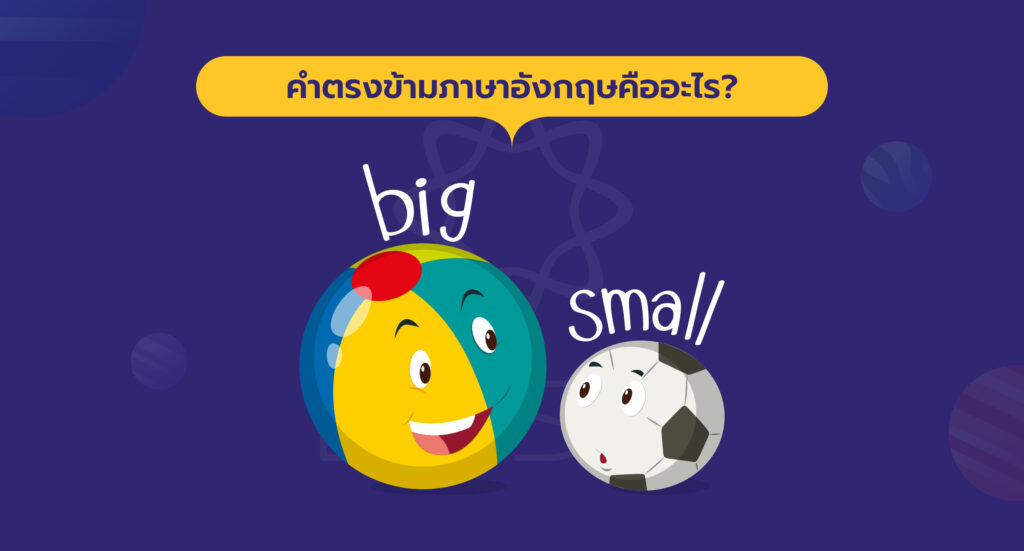
คำตรงข้ามภาษาอังกฤษ – Antonym คือคำศัพท์ที่มีความหมายตรงกันข้ามโดยสิ้นเชิง คำเหล่านั้นมีความหมายตรงกันข้ามและตรงกันข้าม ดังนั้น คำตรงข้ามภาษาอังกฤษจึงถูกนำมาใช้เพื่อเปรียบเทียบสิ่งต่าง ๆ เหตุการณ์ และปรากฏการณ์ในชีวิต
สอบก่อนเข้าฟรี

ตัวอย่าง:
- big – small: ใหญ่ – เล็ก
- off – on: ปิด – เปิด
- night – day: กลางคืน – กลางวัน
- push – pull: ผลัก – ดึง
>>> Read more: Synonym คืออะไร? หน้าที่มันมีอะไรบ้าง
วิธีการสร้างคำคู่ที่มีความหมายตรงกันข้ามในภาษาอังกฤษ
การสร้างคำคู่ที่มีความหมายตรงกันข้ามในภาษาอังกฤษวิธีที่ง่ายที่สุดคือการเพิ่ม prefix ที่หน้าคำศัพท์:
| Prefix: | ตัวอย่าง |
| Prefix “dis-” | Agree → disagreeAppear → disappear |
| Prefix “in-” | Discreet → indiscreetDecent → indecent |
| Prefix “mis-” | Behave → misbehaveTrust → mistrust |
| Prefix “un-” | Fortunate → unfortunateForgiving → unforgiving |
| Prefix “non-” | Sense → nonsenseEntity → nonentity |
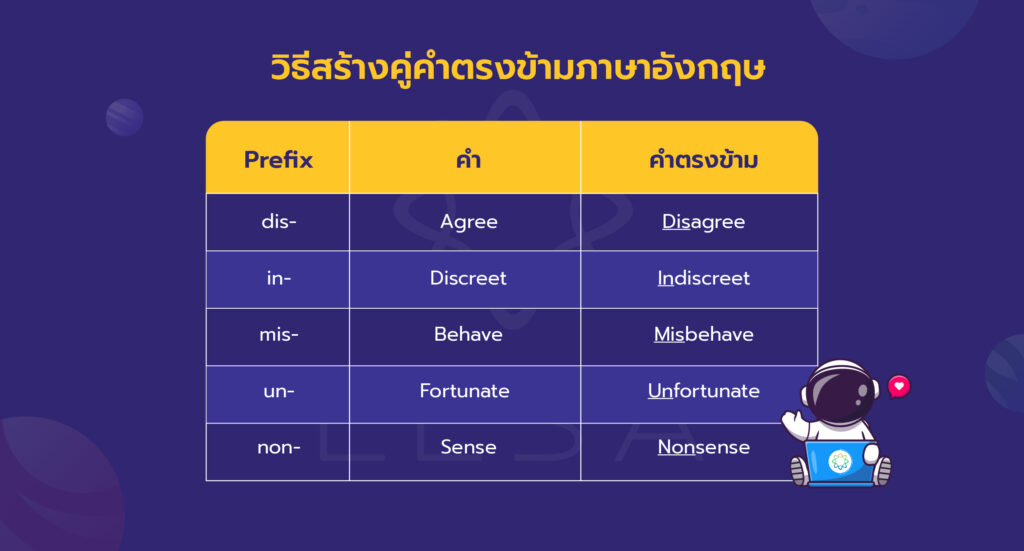
การจัดประเภทคู่คำตรงข้ามภาษาอังกฤษคือ
คู่คำตรงข้ามภาษาอังกฤษคือแบ่งออกเป็น 3 กลุ่มหลัก ดังนี้:
| ประเภท | ตัวอย่าง |
| กลุ่มที่ 1: คู่คำตรงข้ามภาษาอังกฤษที่ไม่มีโครงสร้างร่วมกัน (Complementary Antonyms) → คำในคู่สามารถแยกกันอยู่ได้ | big – small: ใหญ่ – เล็ก off – on: ปิด – เปิด night – day: กลางคืน – กลางวัน push – pull: ผลัก – ดึง |
| กลุ่มที่ 2: คู่คำตรงข้ามภาษาอังกฤษที่ไม่มีอะไรเหมือนกันในโครงสร้าง → คำเหล่านี้ต้องอยู่ร่วมกันเพื่อแสดงความหมาย (Relational Antonyms) | above – below: เหนือ – ใต้ doctor – patient: หมอ – คนไข้ husband – wife: สามี – ภรรยา give – receive: ให้ – รับ |
| กลุ่มที่ 3: คู่คำตรงข้ามภาษาอังกฤษที่แสดงความเปรียบเทียบ (Graded Antonyms) | hard – easy: ยาก – ง่าย happy – wistful: สุข – เศร้า fat – slim: อ้วน – ผอม warm – cool: อุ่น – เย็น |
>>> Read more:
- โครงสร้างประโยคภาษาอังกฤษที่สมบูรณ์
- การเปรียบเทียบขั้นกว่า ขั้นสูงสุด: โครงสร้าง หลักการใช้งาน แบบฝึกหัด
คู่คําตรงข้ามภาษาอังกฤษง่าย ๆ และใช้บ่อยที่สุด

คู่คำคุณศัพท์ตรงกันข้ามภาษาอังกฤษ
| คู่คำคุณศัพท์ตรงกันข้ามภาษาอังกฤษ | คำนิยาม | ตัวอย่าง |
| Alive /əˈlaɪv / >< Dead /ded/ | มีชีวิต >< ตาย | • The dog is alive and barking. (สุนัขยังมีชีวิตและเห่าอยู่) • The tree is dead and needs to be cut down. (ต้นไม้ตายแล้วและต้องถูกตัดลง) |
| All /ɔ:l/ >< None /nʌn/ | ทั้งหมด >< ไม่มีอะไรเลย | • I ate all of the cookies. (ฉันกินคุกกี้หมดแล้ว) • I have none of the money left. (ฉันไม่เหลือเงินเลย) |
| Alone /ə’loun/ >< Together /tə’geðə/ | เดียวดาย >< ด้วยกัน | • I was alone in the house. (ฉันอยู่คนเดียวในบ้าน) • We were together for dinner. (เราทานอาหารเย็นด้วยกัน) |
| Amateur /ˈæmətə/ >< Professional / prəˈfɛʃənl/ | มือสมัครเล่น >< มืออาชีพ | • The amateur painter was very talented. (จิตรกรสมัครเล่นมีความสามารถมาก) • The professional athlete won the race. (นักกีฬามืออาชีพชนะการแข่งขัน) |
| Alike /əˈlaɪk/ >< Different /ˈdɪfrənt/ | เหมือนกัน >< ต่างกัน | • The two brothers look alike. (พี่น้องสองคนดูเหมือนกัน) • The two cars are very different. (รถสองคันนี้แตกต่างกันมาก) |
| Asleep /əˈsliːp/ >< Awake /əˈweɪk/ | นอนหลับ >< ตื่น | • The baby is asleep in the crib. (เด็กกำลังนอนหลับในเปล) • She stayed awake all night worrying about her exam. (เธอตื่นทั้งคืนเพราะกังวลเรื่องการสอบ) |
| Big /big/ >< Small /smɔːl/ | ใหญ่ >< เล็ก | • The elephant is a big animal. (ช้างเป็นสัตว์ตัวใหญ่) • The mouse is a small animal. (หนูเป็นสัตว์ตัวเล็ก) |
| Bright /braɪt/ >< Dark /dɑːrk/ | สว่าง >< มืด | • The sun is bright in the sky. (พระอาทิตย์สว่างบนท้องฟ้า) • Our bedroom was very dark until we put a larger window in. (ห้องนอนของเรามืดมากจนกระทั่งเราใส่หน้าต่างที่ใหญ่ขึ้น) |
| Beautiful /ˈbjuːtɪfl/ >< Ugly /ˈʌɡli/ | สวย >< ขี้เหร่ | • The sunset is beautiful. (พระอาทิตย์ตกสวยงาม) • The dog was ugly and mean. (สุนัขขี้เหร่และดุร้าย) |
| Bitter /ˈbɪtə/ >< Sweet /swiːt/ | ขม >< หวาน | • The coffee is too bitter. (กาแฟขมเกินไป) • The chocolate is very sweet. (ช็อคโกแลตหวานมาก) |
| Black /blæk/ >< White /waɪt/ | ดำ >< ขาว | • The night sky is black. (ท้องฟ้ายามค่ำคืนสีดำ) • The cat is white. (แมวสีขาว) |
| Brave /breɪv/ >< Coward /ˈkaʊərd/ | กล้าหาญ >< ขี้ขลาด | • The dog was brave and stood up to the bigger dog. (สุนัขกล้าหาญและยืนหยัดสู้กับสุนัขตัวที่ใหญ่กว่า) • The coward was afraid to fight and ran away. (คนขี้ขลาดกลัวที่จะสู้และวิ่งหนี) |
| Boring /ˈbɔːrɪŋ/ >< Exciting /ɪkˈsaɪtɪŋ/ | น่าเบื่อ >< น่าตื่นเต้น | • The movie was boring and I fell asleep. (ภาพยนตร์น่าเบื่อจนฉันหลับ) • The roller coaster ride was very exciting. (การนั่งรถไฟเหาะสนุกมาก) |
| Cheap /ʧiːp/ >< Expensive /ɪksˈpɛnsɪv/ | ราคาถูก >< ราคาแพง | • The car is cheap, but it’s not very reliable. (รถราคาถูกแต่ไม่ค่อยน่าเชื่อถือ) • The diamond ring is very expensive. (แหวนเพชรมีราคาแพงมาก) |
| Clever /ˈklɛvə/ >< Stupid /ˈstjuːpɪd/ | ฉลาด >< โง่ | • The dog was clever and learned how to open the door. (สุนัขฉลาดและเรียนรู้วิธีเปิดประตูได้) • The criminal was stupid and got caught by the police. (อาชญากรโง่และถูกตำรวจจับได้) |
| Cold /kəʊld/ >< Warm /wɔ:m/ | หนาว >< อุ่น | • The weather is cold today. (อากาศหนาววันนี้) • The fireplace is making the room warm and cozy. (เตาผิงทำให้ห้องอุ่นและอบอุ่น) |
| Correct /kəˈrekt/ >< Wrong /rɒŋ/ | ถูกต้อง >< ผิด | • The answer is correct. (คำตอบถูกต้อง) • The information is wrong. (ข้อมูลผิด) |
| Clean /kliːn/ >< Dirty /ˈdɜːrti/ | สะอาด >< สกปรก | • The house is clean and tidy. (บ้านสะอาดและเรียบร้อย) • The car is dirty and needs to be washed. (รถสกปรกและต้องล้าง) |
| Cruel /krʊəl/ >< Kind /kaɪnd/ | โหดร้าย >< ใจดี | • The stepmother was cruel to the children. (แม่เลี้ยงทำตัวโหดร้ายกับเด็กๆ) • The teacher was kind and patient with her students. (ครูใจดีและอดทนกับนักเรียน) |
คู่คำนามตรงกันข้ามภาษาอังกฤษ
| คู่คำนามตรงกันข้ามภาษาอังกฤษ | คำนิยาม | ตัวอย่าง |
| Angel /ˈeɪnʤəl/ >< Devil /ˈdevl/ | เทวดา >< ปีศาจ | • The angel was beautiful and kind. (เทวดาสวยงามและใจดี) • The devil was ugly and evil. (ปีศาจขี้เหร่และชั่วร้าย) |
| Day /deɪ/ >< Night /naɪt/ | วัน >< คืน | • The sun shines during the day. (พระอาทิตย์ส่องแสงในตอนกลางวัน) • Most people sleep at night. (คนส่วนใหญ่นอนตอนกลางคืน) |
| Division /dɪˈvɪʒən/ >< Union /ˈjuːnjən/ | การแบ่งแยก >< การรวม | • The division of the country into two states led to war. (การแบ่งแยกประเทศออกเป็นสองรัฐจะนำไปสู่สงคราม) • The union of the two companies created a powerful new force in the market. (การรวมกันของสองบริษัทสร้างพลังใหม่ที่แข็งแกร่งในตลาด) |
| East /i:st/ >< West /west/ | ตะวันออก >< ตะวันตก | • The sun rises in the East. (พระอาทิตย์ขึ้นทางทิศตะวันออก) • The West Coast of the United States is known for its beaches. (ชายฝั่งตะวันตกของสหรัฐอเมริกาขึ้นชื่อเรื่องชายหาด) |
| North /nɔ:θ/ >< South /saʊθ/ | ทิศเหนือ >< ทิศใต้ | • The North Pole is the northernmost point on Earth. (ขั้วโลกเหนือเป็นจุดที่อยู่เหนือที่สุดบนโลก) • The South Pole is the southernmost point. (ขั้วโลกใต้เป็นจุดที่อยู่ใต้ที่สุด) |
| Harm /hɑːm/ >< Benefit /ˈbenɪfɪt/ | อันตราย >< ประโยชน์ | • The violence caused a lot of harm to innocent people. (ความรุนแรงทำให้เกิดอันตรายมากต่อผู้บริสุทธิ์) • The new medicine is expected to benefit many patients. (ยาชนิดใหม่ถูกคาดไว้ว่าจะเป็นประโยชน์กับผู้ป่วยหลายคน) |
| Maximum /ˈmæksɪməm/ >< Minimum /ˈmɪnɪməm/ | สูงสุด >< ต่ำสุด | • The maximum speed limit on this highway is 65 miles per hour. (จำกัดความเร็วสูงสุดบนทางหลวงนี้คือ 65 ไมล์ต่อชั่วโมง) • The minimum wage in the state is $10 per hour. (ค่าแรงขั้นต่ำในรัฐนี้คือ $10 ต่อชั่วโมง) |
| Success /səkˈsɛs/ >< Failure /ˈfeɪljər/ | สำเร็จ >< ล้มเหลว | • The team’s success was due to their hard work and dedication. (ความสำเร็จของทีมเกิดจากการทำงานหนักและความทุ่มเทของพวกเขา) • The company’s failure was due to a number of factors, including poor management and bad luck. (ความล้มเหลวของบริษัทเกิดจากปัจจัยหลายประการ รวมถึงการบริหารจัดการที่ไม่ดีและโชคร้าย ) |
คู่คำกริยาตรงกันข้ามภาษาอังกฤษ
| คู่คำกริยาตรงกันข้ามภาษาอังกฤษ | คำนิยาม | ตัวอย่าง |
| Add /æd/ >< Subtract /səb’trækt/ | เพิ่มเข้า >< ลบออก | • I added two and two to get four. (ฉันเพิ่มสองกับสองจะได้สี่) • I subtracted five from ten to get five. (ฉันลบห้าออกจากสิบเหลือห้า) |
| Accept /əkˈsɛptɪd/ >< Unaccept /ˌʌnəkˈsɛptɪd/ | ยอมรับ ภาษาอังกฤษ >< ปฏิเสธ | • The teacher accepted my apology. (ครูยอมรับคำขอโทษของฉัน) • The application was rejected because it was incomplete. (ใบสมัครถูกปฏิเสธเพราะไม่สมบูรณ์) |
| Admit /ədˈmɪt/ >< Deny /dɪˈnaɪ/ | ยอมรับ >< ปฏิเสธ | • The defendant admitted to the crime. (จำเลยยอมรับการกระทำผิด) • The witness denied seeing anything. (พยานปฏิเสธว่าไม่เห็นอะไรเลย) |
| Agree /əˈgriː/ >< Disagree /ˌdɪsəˈgriː/ | เห็นด้วย >< ไม่เห็นด้วย | • I agree with your assessment. (ฉันเห็นด้วยกับการประเมินของคุณ) • I disagree with your decision. (ฉันไม่เห็นด้วยกับการตัดสินใจของคุณ) |
| Allow /əˈlaʊ/ >< Forbid /fəˈbɪd/ | อนุญาต >< ห้าม | • Children are allowed to play in the park. (เด็กๆ ได้รับอนุญาตให้เล่นในสวนสาธารณะ) • Smoking is forbidden in the building. (ห้ามสูบบุหรี่ในอาคาร) |
| Ask /ɑːsk/ >< Answer /ˈɑːnsə/ | ถาม >< ตอบ | • I asked her a question. (ฉันถามเธอคำถาม) • She answered my question carefully. (เธอตอบคำถามของฉันอย่างระมัดระวัง) |
| Attack /əˈtæk/ >< Defend /dɪˈfend/ | โจมตี >< ป้องกัน | • The enemy attacked the city at dawn. (ศัตรูโจมตีเมืองในยามเช้า) • The soldiers bravely defended their homeland. (ทหารปกป้องบ้านเกิดอย่างกล้าหาญ) |
| Begin /bi’gin/ >< End /end/ | เริ่มต้น >< สิ้นสุด | • The meeting began at 10:00 AM. (การประชุมเริ่มต้นเวลา 10:00 น) • The movie ended with a happy ending. (ภาพยนตร์จบลงด้วยความสุข) |
| Buy /baɪ/>< Sell /sel/ | ซื้อ >< ขาย | • I bought a new car last month. (ฉันซื้อรถใหม่เมื่อเดือนที่แล้ว) • The company is selling its shares to the public. (บริษัทกำลังขายหุ้นให้กับสาธารณชน) |
| Build /bɪld/ >< Destroy /dɪˈstrɔɪ/ | สร้าง >< ทำลาย | • The workers are building a new bridge. (คนงานกำลังสร้างสะพานใหม่) • The hurricane destroyed many homes. (พายุเฮอริเคนทำลายบ้านหลายหลัง) |
| Defeat /dɪˈfiːt/ >< Victory /ˈvɪktəri/ | พ่ายแพ้ >< ชัยชนะ | • The team was defeated by the opposing team. (ทีมพ่ายแพ้ต่อทีมตรงข้าม) • The victory was a major turning point in the war. (ชัยชนะนี้เป็นจุดเปลี่ยนที่สำคัญในสงคราม) |
| Enter /’entə/ >< Exit /’eksit/ | เข้า >< ออก | • Please enter the building through the main door. (กรุณาเข้าตึกผ่านประตูหลัก) • The emergency exit is located at the back of the building. (ทางออกฉุกเฉินตั้งอยู่ด้านหลังตึก) |
| Get /get/ >< Give /giv/ | ได้รับ >< ให้ | • I got a gift for my birthday. (ฉันได้รับของขวัญวันเกิด) • Please give me a moment to think about it. (กรุณาให้เวลาฉันคิดเกี่ยวกับมัน) |
| Laugh /læf/ >< Cry /kraɪ/ | หัวเราะ >< ร้องไห้ | • The children were laughing and playing in the park. (เด็กๆ กำลังหัวเราะและเล่นในสวน) • The woman was crying because she was sad. (ผู้หญิงคนนั้นร้องไห้เพราะเธอเศร้า) |
| Leave /li:v/>< Stay /stei/ | ออกจาก >< อยู่ | • I’m going to leave now. (ฉันจะไปตอนนี้แล้ว) • Please stay for dinner. (กรุณาอยู่ทานข้าวเย็น) |
| Love /lʌv/ >< Hate /heɪt/ | รัก >< เกลียด | • I love my family and friends. (ฉันรักครอบครัวและเพื่อนของฉัน) • The villain hated the hero. (ตัวร้ายเกลียดฮีโร่) |
คู่คำบุพบทตรงข้ามในภาษาอังกฤษ
| คู่คำบุพบทตรงข้ามในภาษาอังกฤษ | คำนิยาม | ตัวอย่าง |
| above /ə’bʌv/ >< below /bi’lou/ | บน >< ล่าง | • The bird is flying above the trees. (นกกำลังบินอยู่เหนือต้นไม้) • The roots of the plant are below the ground. (รากของต้นไม้อยู่ใต้ดิน) |
| Back /bæk/ >< front /frʌnt/ | ด้านหลัง >< ด้านหน้า | • The back of the house is facing the garden. (ด้านหลังของบ้านหันหน้าไปทางสวน) • The front of the car is where the headlights are. (ด้านหน้าของรถคือที่ติดตั้งไฟหน้า) |
| before /bi’fɔ:/ >< after /ɑ:ftə/ | ก่อน >< หลัง | • The accident happened before I arrived. (อุบัติเหตุเกิดขึ้นก่อนที่ฉันจะมาถึง) • I will see you after work. (ฉันจะเจอคุณหลังเลิกงาน) |
| inside /ˌɪnˈsaɪd />< outside /ˌaʊtˈsaɪd / | ข้างใน >< ข้างนอก | • I am inside the house. (ฉันอยู่ในบ้าน) • It is raining outside. (ข้างนอกฝนกำลังตก) |
| left /left/ >< right /rait/ | ซ้าย >< ขวา | • I turned left at the intersection. (ฉันเลี้ยวซ้ายที่สี่แยก) • The right turn lane is on the right side of the road. (เลนเลี้ยวขวาอยู่ด้านขวาของถนน) |
| near /niə/ >< far /fɑ:/ | ใกล้ >< ไกล | • The store is near my house. (ร้านค้าอยู่ใกล้บ้านฉัน) • The mountain is far away. (ภูเขาอยู่ไกลมาก) |
| on /on/ >< off /ɔ:f/ | เปิด >< ปิด | • The light is on. (ไฟเปิดอยู่) • Please turn off the TV when you are not using it. (กรุณาปิดทีวีเมื่อคุณไม่ได้ใช้) |
| under /ˈʌndər/ >< Above /əˈbʌv/ | ใต้ >< บน | • The cat is hiding under the bed. (แมวกำลังซ่อนอยู่ใต้เตียง) • The plane is flying above the clouds. (เครื่องบินกำลังบินเหนือเมฆ) |
| up /ʌp/ >< down /daun/ | ขึ้น >< ลง | • The bird is flying up. (นกกำลังบินขึ้น) • The ball is falling down. (ลูกบอลกำลังตกลง) |
>>> Read more:
คู่คำตรงข้ามภาษาอังกฤษจาก A-Z
คำตรงข้ามที่ขึ้นต้นด้วยตัวอักษร A:
| คำตรงข้ามที่ขึ้นต้นด้วยตัวอักษร A | คำนิยาม | ตัวอย่าง |
| accurate /ˈækjərət/ >< inaccurate /ɪnˈækjərət/ | แม่นยำ >< ไม่แม่นยำ | • The scientist’s findings were accurate and reliable. (ข้อค้นพบของนักวิทยาศาสตร์นั้นแม่นยำและเชื่อถือได้) • The map was inaccurate, so we got lost. (แผนที่ไม่แม่นยำ ดังนั้นเราจึงหลงทาง) |
| adamant /ˈædəmənt/ >< flexible /ˈfleksəbl/ | เด็ดเดี่ยว >< ยืดหยุ่น | • The manager was adamant that we follow the rules. (ผู้จัดการเด็ดเดี่ยวว่าเราต้องปฏิบัติตามกฎ) • The company needs to be more flexible in order to adapt to the changing market. (บริษัทต้องยืดหยุ่นมากขึ้น เพื่อปรับตัวให้เข้ากับตลาดที่เปลี่ยนแปลง) |
| adult /əˈdʌlt/ >< child /tʃaɪld/ | ผู้ใหญ่ >< เด็ก | • Adults are responsible for taking care of their children. (ผู้ใหญ่มีหน้าที่รับผิดชอบในการดูแลเด็ก) • Children need to be protected from harm. (เด็กๆ ต้องได้รับการปกป้องจากอันตราย) |
| Advantage /ədˈvæntɪdʒ/ >< disadvantage | ข้อได้เปรียบ >< ข้อเสียเปรียบ | • Having a good education is a major advantage in the job market. (การมีการศึกษาที่ดีเป็นข้อได้เปรียบสำคัญในตลาดงาน) • The company’s small size is a disadvantage in competing with larger companies. (ขนาดเล็กของบริษัทเป็นข้อเสียเปรียบในการแข่งขันกับบริษัทใหญ่) |
| always /ˈɔːlweɪz/ >< never /ˈnevər/ | เสมอ >< ไม่เคย | • The sun always rises in the east. (ดวงอาทิตย์ขึ้นทางทิศตะวันออกเสมอ) • I will never forget what you did to me. (ฉันจะไม่มีวันลืมสิ่งที่คุณทำกับฉัน) |
| ancestor /ˈænsestər/ >< descendant /dɪˈsendənt/ | บรรพบุรุษ >< ลูกหลาน | • My ancestors came from England. (บรรพบุรุษของฉันมาจากอังกฤษ) • I am a descendant of the original settlers of this country. (ฉันเป็นลูกหลานของผู้ตั้งถิ่นฐานดั้งเดิมของประเทศนี้) |
| antonym /ˈæntənɪm/ >< synonym /ˈsɪnənɪm/ | คำตรงข้าม >< คำเหมือน | • “Hot” and “cold” are antonyms. (ร้อนและเย็นเป็นคำตรงข้าม) • “Happy” and “joyful” are synonyms. (มีความสุขและยินดีเป็นคำเหมือน) |
คำตรงข้ามที่ขึ้นต้นด้วยตัวอักษร B:
| คำตรงข้ามที่ขึ้นต้นด้วยตัวอักษร B | คำนิยาม | ตัวอย่าง |
| bind /baɪnd/ >< release /rɪˈliːs/ | ผูกมัด >< ปล่อย | • The prisoner was bound in chains. (นักโทษถูกผูกด้วยโซ่) • The hostages were finally released. (ตัวประกันถูกปล่อยในที่สุด) |
| blunt /blʌnt/ >< sharp /ʃɑːrp/ | ทื่อ >< คม | • The knife was too blunt to cut the bread. (มีดทื่อเกินไปที่จะตัดขนมปัง) • Be careful with that sharp knife! (ระวังมีดคมนั้นด้วย!) |
| body /ˈbɑːdi/ >< soul /səʊl/ | ร่างกาย >< วิญญาณ | • The doctor examined the patient’s body. (หมอตรวจร่างกายของผู้ป่วย) • She believed in the immortality of the soul. (เธอเชื่อในความเป็นอมตะของวิญญาณ) |
| boisterous /ˈbɔɪstərəs/ >< placid /ˈplæsɪd/ | เสียงดัง >< เงียบสงบ | • The children were having a boisterous time at the party. (เด็กๆ กำลังสนุกสนานในงานเลี้ยง) • The lake was placid and serene. (ทะเลสาบเงียบสงบและสงบเงียบ) |
| borrow /ˈbɔːrəʊ/ >< lend /lend/ | ยืม >< ให้ยืม | • Can I borrow your pen? (ฉันขอยืมปากกาของคุณได้ไหม?) • I’ll lend you my car if you need it. (ฉันจะให้คุณยืมรถของฉันถ้าคุณต้องการ) |
| brittle /ˈbrɪtl/ >< tough /tʌf/ | เปราะ >< แข็งแรง | • The cookie was brittle. (คุกกี้กรอบ) • The rope was tough and strong. (เชือกแข็งแรงและทนทาน) |
คำตรงข้ามที่ขึ้นต้นด้วยตัวอักษร C:
| คำตรงข้ามที่ขึ้นต้นด้วยตัวอักษร C | คำนิยาม | ตัวอย่าง |
| clockwise /ˈklɑːkwaɪz/ >< anticlockwise /ˌæntiˈklɑːkwaɪz/ | ตามเข็มนาฬิกา >< ทวนเข็มนาฬิกา | • The hands of the clock were moving clockwise. (เข็มนาฬิกากำลังเคลื่อนที่ตามเข็มนาฬิกา) • The car turned anticlockwise into the street. (รถหันทวนเข็มนาฬิกาเข้าสู่ถนน) |
| common /ˈkɑːmən/ >< rare /rer/ | ทั่วไป >< หายาก | • The common cold is a viral infection that is easily spread. (โรคหวัดหัวใจเป็นโรคติดเชื้อไวรัสที่แพร่หลายได้ง่าย.) • Rare animals are protected by law. (สัตว์ที่หายากได้รับความคุ้มครองจากกฎหมาย.) |
| cunning /ˈkʌnɪŋ/ >< naive /naɪˈiːv/ | ฉลาดแกมโกง >< ไร้เดียงสา | • The fox was cunning and managed to escape the trap. (จิ้งจอกเป็นสมองแห่งการหลบหลีกและหลบไปจากกับดัก) • The naive young woman was easily taken advantage of. (ผู้หญิงสาวที่อ่อนแอถูกใช้ประโยชน์ได้ง่าย) |
คำตรงข้ามที่ขึ้นต้นด้วยตัวอักษร D:
| คำตรงข้ามที่ขึ้นต้นด้วยตัวอักษร D | คำนิยาม | ตัวอย่าง |
| desperate /ˈdespərət/ >< hopeful /ˈhəʊpfl/ | ความสิ้นหวัง >< ความหวัง การมองโลกในแง่ดี | • The lost hikers were desperate to be found. (นักปีนเขาเสียหายอยากให้พบ) • Despite the challenges, she remained hopeful about the future. (ไม่ว่าจะมีความท้าทายอะไรก็ตามเธอยังคงมีความหวังในอนาคต) |
| Dry /draɪ/ >< Wet /wet/ | แห้ง >< เปียก | • The desert is a dry and barren place. (ทะเลทรายเป็นสถานที่แห้งและโหดร้าย) • The towels were still wet from the shower. (ผ้าขนหนูยังคงเปียกจากการอาบน้ำ) |
| domestic /dəˈmestɪk/ >< foreign /ˈfɔːrən/ | ในประเทศ ในประเทศ >< ต่างประเทศ | • The company produces both domestic and foreign goods. (บริษัทผลิตสินค้าทั้งภายในและต่างประเทศ) • He traveled to foreign countries. (เขาเดินทางไปยังประเทศต่างๆ) |
คำตรงข้ามที่ขึ้นต้นด้วยตัวอักษร E:
| คำตรงข้ามที่ขึ้นต้นด้วยตัวอักษร E | คำนิยาม | ตัวอย่าง |
| export /ˈekspɔːrt/ >< import /ˈɪmpɔːrt/ | ส่งออก >< นำเข้า | • Vietnam exports rice to many countries around the world. (เวียดนามส่งออกข้าวไปยังหลายประเทศทั่วโลก) • The United States imports oil from many countries. (สหรัฐฯนำเข้าน้ำมันจากหลายประเทศ) |
| exclude /ɪkˈskluːd/ >< include /ɪnˈkluːd/ | ไม่รวม, ไม่รวม >< รวม, ทั้งหมด | • Some students were excluded from the exam. (บางนักเรียนถูกตัดออกจากการสอบ) • The company’s new policy includes all employees. (นโยบายใหม่ของบริษัทรวมถึงพนักงานทั้งหมด) |
คำตรงข้ามที่ขึ้นต้นด้วยตัวอักษร F:
| คำตรงข้ามที่ขึ้นต้นด้วยตัวอักษร F | คำนิยาม | ตัวอย่าง |
| Fat /fæt/ >< Thin /θɪn/ | อ้วน >< ผอม | • The doctor advised him to lose weight because he was too fat. (แพทย์แนะนำให้เขาลดน้ำหนักเพราะเขาอ้วนเกินไป) • She was very thin and frail after her illness. (เธอผอมและอ่อนแอมากหลังจากเจ็บป่วย) |
| First /fɜːrst/ >< Last /læst/ | ครั้งแรก >< สุดท้าย | • The first person in line will be served next. (คนแรกในแถวจะได้รับการบริการต่อไป) • I saved the best dessert for last. (ฉันเก็บของหวานที่ดีที่สุดไว้ให้ล่าสุด) |
| foolish /ˈfuːlɪʃ/ >< wise /waɪz/ | โง่เขลา >< ฉลาดฉลาด | • It was a foolish decision to invest in that company. (การตัดสินใจลงทุนในบริษัทนั้นเป็นการลงทุนที่โง่เขลา) • The wise old man gave me some valuable advice. (คนรุ่นพี่ที่ฉลาดให้คำแนะนำที่มีค่าสำหรับฉัน) |
คำตรงข้ามที่ขึ้นต้นด้วยตัวอักษร G:
| คำตรงข้ามที่ขึ้นต้นด้วยตัวอักษร G | คำนิยาม | ตัวอย่าง |
| gentleman ˈdʒentlmən/ >< lady /ˈleɪdi/ | สุภาพบุรุษ ผู้ชาย >< ผู้หญิง ผู้หญิง | • The gentleman helped the elderly woman cross the street. (ผู้บุกเบิกช่วยสตรีชราข้ามถนน) • The lady at the counter was very helpful. (ผู้หญิงที่เคาน์เตอร์ช่วยเหลืออย่างดี) |
| general /ˈdʒenrəl/ >< particular /pərˈtɪkjələr/ | ภาพรวม ทั่วไป >< เฉพาะ รายละเอียด | • The general idea is that we need to work together. (ความคิดทั่วไปคือเราต้องทำงานร่วมกัน) • I need to know more particulars before I can make a decision. (ฉันต้องรู้ข้อมูลเพิ่มเติมก่อนที่จะตัดสินใจได้) |
คำตรงข้ามที่ขึ้นต้นด้วยตัวอักษร H:
| คำตรงข้ามที่ขึ้นต้นด้วยตัวอักษร H | คำนิยาม | ตัวอย่าง |
| handsome /ˈhænsəm/ >< ugly /ˈʌɡli/ | หล่อ><น่าเกลียด | • The prince was very handsome and charming. (เจ้าชายหล่อเสน่ห์มาก) • The witch was ugly and wicked. (แม่มดมีหน้าที่ขี้เหร่และชั่วร้าย) |
| heaven /ˈhevn/ >< hell /hel/ | สวรรค์ >< นรก | • Heaven is a place of peace and happiness. (สวรรค์เป็นที่อยู่ของความสงบและความสุข) • Hell is a place of suffering and torment. (นรกเป็นที่อยู่ของความทุกข์ทรมาน) |
| heavy /ˈhevi/ >< light /laɪt/ | หนัก >< เบา | • The rock was too heavy for me to lift. (หินหนักเกินไปที่จะยกได้) • The feather was so light that it blew away in the wind. (ขนนกมีน้ำหนักเบามากถึงขนาดที่ถูกลมพัดไป) |
คำตรงข้ามที่ขึ้นต้นด้วยตัวอักษร I:
| คำตรงข้ามที่ขึ้นต้นด้วยตัวอักษร I | คำนิยาม | ตัวอย่าง |
| important /ɪmˈpɔːrtnt/ >< trivial /ˈtrɪviəl/ | สำคัญ >< ไม่สำคัญ, จิ๊บจ๊อย | • The doctor said that it was important for me to take my medication. (แพทย์บอกว่าสำคัญที่ฉันจะต้องทานยาของฉัน) • Don’t worry about such trivial things. (อย่ากังวลเกี่ยวกับเรื่องที่เล็กน้อยแบบนี้) |
| inhale /ɪnˈheɪl/ >< exhale /eksˈheɪl/ | หายใจเข้า >< หายใจออก | • The baby took a deep breath and inhaled. (ทารกหายใจลึกและหายใจเข้า) • The runner exhaled heavily after finishing the race. (นักวิ่งถอนอากาศออกหนักหลังจากแข่งขันจบ) |
คำตรงข้ามที่ขึ้นต้นด้วยตัวอักษร L:
| คำตรงข้ามที่ขึ้นต้นด้วยตัวอักษร L | คำนิยาม | ตัวอย่าง |
| lengthen /ˈleŋkθən/ >< shorten /ˈʃɔːrtn/ | ยาวขึ้น >< ทำให้สั้นลง | • The carpenter lengthened the table by adding two extensions. (ช่างไม้ยืดโต๊ะโดยการเพิ่มส่วนขยายสองชิ้น) • The dress was too long, so she had it shortened. (ชุดเสื้อยาวเกินไปดังนั้นเธอต้องตัดมันสั้นลง) |
| limited /ˈlɪmɪtɪd/ >< boundless /ˈbaʊndləs/ | ขีดจำกัด >< อนันต์ ไม่มีที่สิ้นสุด | • The number of tickets is limited, so you should buy yours early. (จำนวนตั๋วจำกัดดังนั้นคุณควรซื้อของคุณไว้ก่อน) • The ocean is boundless and full of mysteries. (มหาสมุทรกว้างไกลและเต็มไปด้วยความลึกลับ) |
| laugh /læf/ >< cry /kraɪ/ | หัวเราะ >< ร้องไห้ | • The children laughed at the funny clown. (เด็กๆหัวเราะกับตัวตลกฮา) • The woman cried when she heard the news of her mother’s death. (ผู้หญิงร้องไห้เมื่อได้ยินข่าวการตายของแม่) |
คำตรงข้ามที่ขึ้นต้นด้วยตัวอักษร M:
| คำตรงข้ามที่ขึ้นต้นด้วยตัวอักษร M | คำนิยาม | ตัวอย่าง |
| marry /ˈmæri/ >< divorce /dɪˈvɔːrs/ | การแต่งงาน >< การหย่าร้าง | • The couple got married last year. (คู่รักแต่งงานกันเมื่อปีที่แล้ว) • The couple filed for divorce after years of separation. (คู่รักยื่นขอหย่าหลังจากปีที่ห่างหาย) |
| minority /maɪˈnɔːrəti/ >< majority /məˈdʒɔːrəti/ | ชนกลุ่มน้อย >< ส่วนใหญ่ | • The ethnic minority group is facing discrimination. (กลุ่มน้อยหมายเลขน้อยต้องเผชิญกับการเลือกปฏิบัติที่ไม่ยุติธรรม) • The majority of voters supported the new law. (ส่วนใหญ่ของผู้เลือกสนับสนุนกฎหมายใหม่) |
คำตรงข้ามที่ขึ้นต้นด้วยตัวอักษร N:
| คำตรงข้ามที่ขึ้นต้นด้วยตัวอักษร N | คำนิยาม | ตัวอย่าง |
| New /nuː/ >< Old /əʊld/ | ใหม่ >< เก่า | • I bought a new car last week. (ฉันซื้อรถใหม่เมื่อสัปดาห์ที่แล้ว) • My grandfather is very old. (ปู่ของฉันอายุมาก) |
| narrow /ˈnærəʊ/ >< broad /brɔːd/ | แคบ >< กว้างขวาง | • The road was too narrow for my car. (ถนนแคบเกินไปสำหรับรถของฉัน) • The ocean is very broad. (มหาสมุทรกว้างไกลมาก) |
คำตรงข้ามที่ขึ้นต้นด้วยตัวอักษร O:
| คำตรงข้ามที่ขึ้นต้นด้วยตัวอักษร O | คำนิยาม | ตัวอย่าง |
| outer /ˈaʊtər/ >< inner /ˈɪnər/ | ภายนอก >< ภายใน | • The outer layer of the cake is crispy. (ชั้นนอกของเค้กกรอบ) • The inner parts of the country are less developed. (ส่วนในของประเทศมีการพัฒนาน้อยกว่า) |
| optimist /ˈɑːptɪmɪst/ >< pessimist /ˈpesɪmɪst/ | ผู้มองโลกในแง่ดี >< ผู้มองโลกในแง่ร้าย | • An optimist always believes that there is a silver lining in every cloud. (ผู้เชื่อมั่นที่เสมอตรึงใจว่าในทุกๆเมฆย่อมมีแสงหวาน) • A pessimist always expects the worst to happen. (ผู้เชื่อมั่นที่เสมอคาดหวังว่าสิ่งที่แย่ที่สุดจะเกิดขึ้น) |
คำตรงข้ามที่ขึ้นต้นด้วยตัวอักษร P:
| คำตรงข้ามที่ขึ้นต้นด้วยตัวอักษร P | คำนิยาม | ตัวอย่าง |
| poverty /ˈpɑːvərti/ >< wealth /welθ/ | จน >< รวย | • Millions of people live in poverty around the world. (ล้านๆคนดำรงชีวิตอยู่ในความยากจนทั่วโลก) • The wealthy family donated millions of dollars to charity. (ครอบครัวที่รวยบริจาคเงินล้านเหรียญให้กับการกุศล) |
| plentiful /ˈplentɪfl/ >< scarce /skers/ | มากมาย >< ขาดแคลน | • There is a plentiful supply of food in the country. (มีการจัดหาอาหารมากมายในประเทศ) • Water is scarce in many parts of the world. (น้ำขาดแคลนในหลายพื้นที่ของโลก) |
| permanent /ˈpɜːrmənənt/ >< temporary /ˈtempəreri/ | ถาวร >< ชั่วคราว | • The permanent damage to the environment is a serious concern. (ความเสียหายถาวรต่อสิ่งแวดล้อมเป็นปัญหาที่สำคัญ) • The temporary workers will be replaced by full-time employees next month. (พนักงานชั่วคราวจะถูกแทนที่ด้วยพนักงานเต็มเวลาเดือนหน้า) |

คำตรงข้ามที่ขึ้นต้นด้วยตัวอักษร R:
| คำตรงข้ามที่ขึ้นต้นด้วยตัวอักษร R | คำนิยาม | ตัวอย่าง |
| raise /reɪz/ >< lower /ˈləʊər/ | ยกขึ้น ยกมือขึ้น >< ลดต่ำลง | • The farmer raised his hand to signal for help. (ชาวนายกมือขึ้นสัญญาณขอความช่วยเหลือ) • The flag was lowered to half-mast in honor of the fallen soldier. (ธงถูกลดลงให้ที่ครึ่งเสาเพื่อเป็นเกียรติต่อทหารที่ล้มลง) |
| rich /rɪtʃ/ >< poor /pʊr/ | รวย >< ยากจน | • The rich man donated a large sum of money to charity. The poor family lived in a small, cramped apartment. (ครอบครัวจนจัดอาศัยอยู่ในอพาร์ตเมนต์เล็กและแน่นแน่น) |
คำตรงข้ามที่ขึ้นต้นด้วยตัวอักษร S:
| คำตรงข้ามที่ขึ้นต้นด้วยตัวอักษร S | คำนิยาม | ตัวอย่าง |
| same /seɪm/ >< opposite /ˈɑːpəzɪt/ | เหมือนกัน >< ตรงกันข้าม ตรงกันข้าม | • The twins look exactly the same. (คู่ฝาแฝดดูเหมือนกันทุกประการ) • Hot and cold are opposite temperatures. (ร้อนและเย็นเป็นอุณหภูมิที่ตรงข้ามกัน) |
| soft /sɔːft/ >< hard /hɑːrd/ | อ่อน >< แข็ง | • The baby’s skin is soft and smooth. (ผิวของทารกนุ่มและเรียบ) • The rock was hard and smooth. (หินแข็งและเรียบ) |
| sow /səʊ/ >< reap /riːp/ | การหว่านเมล็ด >< การเก็บเกี่ยว | • The farmer sowed the seeds in the spring. (ชาวนาหว่านเมล็ดพันธุ์ในฤดูใบไม้ผลิ) • Farmers reap the wheat in the fields during autumn. (ชาวนาเก็บเกี่ยวข้าวสาลีในนาในช่วงหน้าร้อน) |
คำตรงข้ามที่ขึ้นต้นด้วยตัวอักษร T:
| คำตรงข้ามที่ขึ้นต้นด้วยตัวอักษร T | คำนิยาม | ตัวอย่าง |
| tame /teɪm/ >< wild /waɪld/ | เลี้ยงในบ้าน >< ดุร้าย | • The farmer tamed the wild horses. (ชาวนาเลี้ยงม้าป่า) • The wild animals in the jungle are dangerous. (สัตว์ป่าในป่ามีความเสี่ยง) |
| true /truː/ >< false /fɔːls/ | จริง >< เท็จ | • It is true that the Earth is round. (ความจริงคือโลกเป็นทรงกลม) • The rumor that he was arrested is false. (ข่าวลือว่าเขาถูกจับไม่เป็นความจริง) |
คำตรงข้ามที่ขึ้นต้นด้วยตัวอักษร U:
| คำตรงข้ามที่ขึ้นต้นด้วยตัวอักษร U | คำนิยาม | ตัวอย่าง |
| upstairs /ˌʌpˈsterz/>< downstairs /ˌdaʊnˈsterz/ | ชั้นบน >< ชั้นล่าง | • The bedrooms are upstairs. (ห้องนอนอยู่ชั้นบน) • The living room is downstairs. (ห้องนั่งเล่นอยู่ชั้นล่าง) |
| unqualified /ˌʌnˈkwɑːlɪfaɪd/ >< qualified /ˈkwɑːlɪfaɪd/ | ไม่ผ่านการรับรอง >< ผ่านการรับรอง | • The applicant was unqualified for the job. (ผู้สมัครไม่มีคุณสมบัติสำหรับงาน) • The doctor is qualified to perform surgery. (แพทย์มีคุณสมบัติในการทำศัลยกรรม) |
คำตรงข้ามที่ขึ้นต้นด้วยตัวอักษร V:
| คำตรงข้ามที่ขึ้นต้นด้วยตัวอักษร V | คำนิยาม | ตัวอย่าง |
| victory /ˈvɪktəri/ >< defeat /dɪˈfiːt/ | ชัยชนะ >< ความล้มเหลว | • The team won a victory in the championship game. (ทีมชนะชิงชนะเลิศในเกมแชมป์) • The army suffered a defeat in the war. (กองทัพประสบความสูญเสียในสงคราม) |
| vast /væst/ >< tiny /ˈtaɪni/ | ใหญ่ >< เล็ก | • The vast ocean is full of mystery. (มหาสมุทรกว้างไกลเต็มไปด้วยความลึกลับ) • The tiny ant crawled across the leaf. (มดขนาดเล็กข้ามใบไม้) |
คำตรงข้ามที่ขึ้นต้นด้วยตัวอักษร W:
| คำตรงข้ามที่ขึ้นต้นด้วยตัวอักษร W | คำนิยาม | ตัวอย่าง |
| weak /wiːk/ >< strong /strɔːŋ/ | อ่อนแอ >< แข็งแรง สุขภาพดี | • The weak person was unable to lift the heavy object. (คนอ่อนแอไม่สามารถยกวัตถุที่หนักได้) • The strong man easily lifted the heavy object. (คนอ่อนแอไม่สามารถยกวัตถุที่หนักได้) |
| win /wɪn/ >< lose /luːz/ | ชนะ >< แพ้ | • The team won the game. (ทีมชนะเกม) • The team lost the game. (ทีมแพ้เกม) |
>>> Read more: Phrasal verbs ที่พบบ่อยที่สุด 200 คำจาก A-Z
แบบฝึกหัดคำตรงข้ามภาษาอังกฤษ
แบบฝึกหัด คำ ตรง ข้าม ภาษาอังกฤษ : เลือกคำตรงข้ามกับคำที่มีเส้นขีดเส้นใต้
1. It was brave of you to speak in front of many people.
| A. good | B. wonderful | C. coward | D. courageous |
2. The sun soon dispelled the thick fog.
| A. thin | B. many | C. long | D. far |
3. That consignment is too much for my horse to pull.
| A. take | B. lay | C. raise | D. push |
4. With the victory over France in the final match, Brazil became the first team to win the trophy five times.
| A. fall | B. lose | C. upset | D. defeat |
5. Name some famous singers in the world.
| A. infamous | B. unknown | C. impossible | D. irregular |
6. My suitcases are so heavy.
| A. thin | B. light | C. large | D. round |
7. The best time to visit is during the dry season, from November to April, when the hard forest rain is over.
| A. wet | B. engaging | C. obvious | D. cordial |
8. The chairs felt hard and uncomfortable.
| A. plastic | B. simple | C. relaxed | D. soft |
9. Visitors, especially children, can go there to learn how to recognize the different species of flora and fauna.
| A. pure | B. same | C. alike | D. whole |
10. You can slide the front seat forward if necessary.
| A. back | B. beside | C. above | D. under |
11. John looks healthy enough.
| A. sick | B. strong | C. ugly | D. slim |
12. But I like Chinese best because it’s an important means of international communication.
| A. love | B. miss | C. hate | D. ignore |
13. I’ve been learning French for two years now, so I can speak French quite well.
| A. pretty | B. badly | C. rather | D. helplessly |
14. We live in a small flat above the corner shop on The Queen Street.
| A. huge | B. immense | C. titanic | D. big |
15. He has to ride his bike in narrow and crowded streets on the way to and from school.
| A. little | B. few | C. empty | D. minor |
16. I don’t really like getting up early but I have to because I often have lessons at 7 a.m.
| A. lately | B. late | C. early | D. firstly |
17. We live in a small flat above the corner shop on The King Street.
| A. under | B. beneath | C. below | D. after |
18. What time do you go to bed?
| A. go out | B. sit down | C. leave for | D. get up |
19. I drink some cups of tea, have a quick breakfast and then lead the buffalo to the field.
| A. weak | B. strict | C. slow | D. thin |
20. Our neighbors have always been very friendly toward us.
| A. cool | B. hot | C. warm | D. mad |
คำตอบ แบบฝึกหัด คำ ตรง ข้าม ภาษาอังกฤษ :
| 1. C | 2. A | 3. D | 4. D | 5. B | 6. B | 7. A | 8. D | 9. B | 10. A |
| 11. A | 12. C | 13. B | 14. D | 15. C | 16. B | 17. C | 18. D | 19. C | 20. A |
ในความเป็นจริงแล้ว เมื่อคุณต้องการเพิ่มศักยภาพในการใช้ศัพท์ คู่คำตรงกันข้ามในภาษาอังกฤษจึงเป็นสิ่งที่ไม่ควรพลาดไป บทความนี้ของ ELSA Speak ได้ให้ข้อมูลเกี่ยวกับคู่คำตรงกันข้ามที่ใช้ง่ายและนิยมที่สุดในปัจจุบัน อย่าลืมฝึกฝนอย่างสม่ำเสมอทุกวันนะ!


